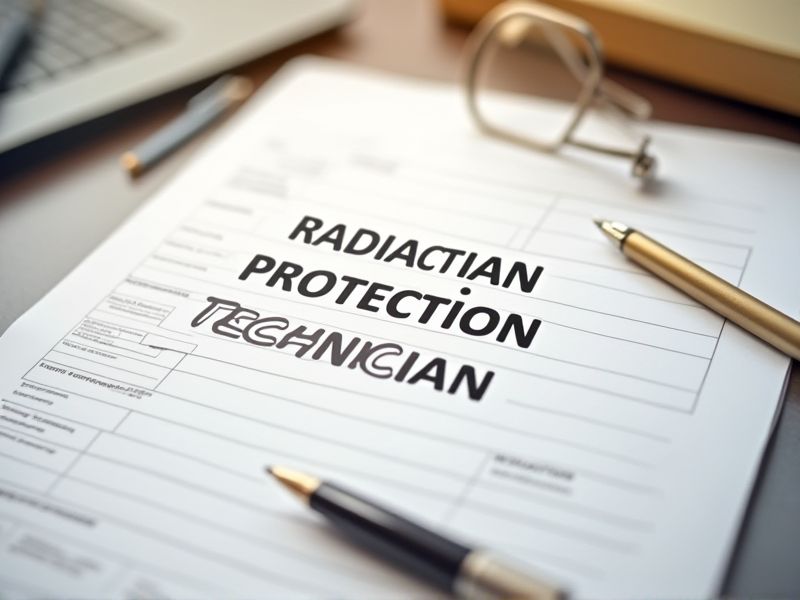
Radiation Protection Technicians play a critical role in ensuring safety in environments with potential exposure to harmful radiation. They must possess a thorough understanding of regulatory standards and operational safety procedures to mitigate risks effectively. Certifications validate their expertise and commitment to maintaining safety standards, which is essential for both legal compliance and the protection of public health. Consider these key certifications that could be essential for a Radiation Protection Technician.
Radiation Protection Technologist (RPT) Certification
Radiation Protection Technologist (RPT) Certification establishes a standardized qualification, ensuring that technicians possess a consistent level of knowledge and skills. Without certification, inconsistencies in training could lead to human error, increasing the risk of radiation mismanagement. Certified technicians are often better prepared to implement safety protocols, thereby minimizing occupational exposure to radiation. Employers might prefer hiring certified technicians, which can enhance career opportunities in the nuclear industry.
Certified Health Physicist (CHP) Certification
The Certified Health Physicist (CHP) certification is often required for radiation protection technicians because it signifies a high level of expertise and understanding of radiation safety principles. Rigorous exams ensure that individuals possess the necessary skills to implement effective radiation protection measures. Employers often prioritize hiring CHPs to mitigate risks associated with radiation exposure, thereby reducing liability. The CHP credential enhances credibility and trust, essential for maintaining safety in environments where radiation is present.
Radiation Safety Officer (RSO) Certification
RSO Certification ensures that a Radiation Protection Technician is thoroughly trained in handling and monitoring radioactive materials safely, reducing potential health risks. It establishes a standardized understanding of radiation safety protocols, which is crucial for maintaining compliance with federal and state regulations. Certification underscores a professional's capability to respond effectively to radiation emergencies, enhancing workplace safety and public confidence. Employers often require RSO Certification to demonstrate the technician's competence and commitment to minimizing radiation hazards in their operations.
Nuclear Regulatory Commission (NRC) Certification
The NRC certification ensures that Radiation Protection Technicians have the requisite knowledge and skills to safely manage and monitor nuclear materials, reducing the risk of accidental exposure. It provides a standardized benchmark for competency, enhancing public trust in the safety protocols of nuclear facilities. Certification reinforces compliance with federal regulations, which helps to avoid potential legal and financial repercussions for nuclear facilities. It also promotes consistency in safety practices across the industry, which is crucial for preventing incidents that could have severe environmental and health consequences.
Certified Radiological Technician (CRT) Certification
The CRT certification helps ensure that a Radiation Protection Technician possesses the foundational knowledge required to handle radiological equipment safely. By requiring this certification, employers can be more confident that technicians have been trained to adhere to stringent safety protocols, minimizing radiation exposure risks. The certification provides a standardized measure of competence, which is crucial for maintaining safe environments in medical and industrial settings. Regulatory agencies often mandate certification to ensure compliance with legal and safety standards in radiological protection practices.
OSHA 30-Hour General Industry Certification
Radiation Protection Technicians face various occupational hazards, and OSHA 30-Hour General Industry Certification equips them with knowledge on critical safety standards. The certification offers training on hazard recognition and preventive measures, directly impacting workplace safety and compliance. Employers reduce risk of incidents and legal issues by ensuring technicians hold this qualification. Technicians enhance proficiency in handling radiation, further safeguarding both personnel and environment.
HAZWOPER (Hazardous Waste Operations and Emergency Response) Certification
HAZWOPER certification equips Radiation Protection Technicians with essential knowledge of handling hazardous materials safely, reducing the risk of radiation exposure. Compliance with federal regulations mandates this certification to ensure all technicians adhere to standardized safety protocols. Training under HAZWOPER provides critical skills in emergency response, enhancing efficiency during radiation emergencies. Certification also ensures that technicians can effectively manage hazardous waste, maintaining environmental safety and public health.
First Responder Safety Certification
First Responder Safety Certification is crucial for Radiation Protection Technicians because it ensures they possess the essential skills to manage and respond to radiological emergencies effectively. Proper certification provides technicians with the knowledge to minimize radiation exposure, protecting both themselves and the public. Certification establishes standardized protocols for communication and coordination among various emergency response teams. It supports regulatory compliance with government safety standards, enhancing public confidence in radiological safety measures.
Certified Emergency Response Coordinator (CERC) Certification
The CERC certification enhances the skills of Radiation Protection Technicians by providing them with critical emergency management capabilities. Effective response to radiation incidents necessitates coordination and communication, both addressed by CERC standards. With CERC training, technicians are equipped to quickly assess and mitigate risks posed by radiation emergencies. This certification also ensures that technicians adhere to industry best practices, thereby reducing potential health hazards.
ISO 45001 Occupational Health and Safety Management Certification
ISO 45001 certification enhances a Radiation Protection Technician's ability to identify and mitigate workplace hazards effectively, reducing the risk of radiation exposure. Compliance with the standard demonstrates a commitment to maintaining a safe work environment, which builds trust with employers and regulatory bodies. The structured management system outlined in ISO 45001 aids in the systematic improvement of safety procedures and emergency response plans, crucial in high-risk settings like radiation facilities. Certification can lead to better job prospects and professional development opportunities within the field of occupational health and safety.
Summary
You can expect a significant enhancement in job prospects when Radiation Protection Technicians obtain certifications. These credentials often lead to increased trust and responsibility from employers, reflecting a technician's commitment to maintaining optimal safety standards. Certification can also result in potential salary increases, aligning with the advanced skills and knowledge acquired. Moreover, it ensures adherence to industry regulations, which is crucial for organizational compliance and operational efficiency.
